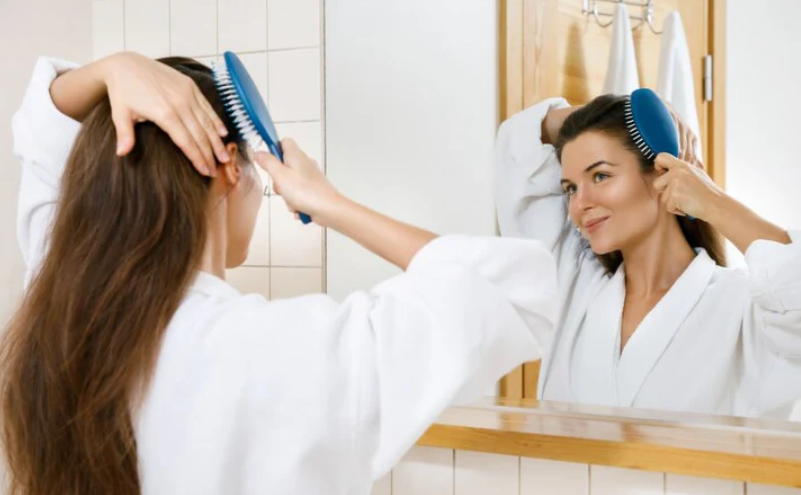Caring for Delicate Hair

Understanding Hair Sensitivity
Hair and scalp sensitivity is a common condition where the scalp reacts to external factors such as harsh chemicals, environmental stress, or unsuitable hair products. People with sensitive scalp may experience itching, redness, dryness, or irritation. Choosing the right shampoo and hair care routine is crucial to maintaining healthy and balanced hair.
Common Causes of Scalp Sensitivity
Harsh Chemicals in Hair Products
Shampoos containing sulfates, parabens, and strong fragrances can strip natural oils and irritate the scalp. Using gentle formulations designed for delicate hair reduces the risk of flare-ups.
Environmental Factors
Pollution, sun exposure, and extreme weather conditions can weaken the scalp barrier, making it more prone to sensitivity. Protection through mild cleansing and hydration is essential.
Lifestyle Influences
Stress, poor diet, and lack of sleep can impact scalp health. A balanced lifestyle contributes to a calmer, healthier scalp environment.
Key Ingredients for Sensitive Hair Care
Soothing Botanicals
Chamomile, aloe vera, and calendula are natural ingredients that help calm irritation and reduce redness.
Gentle Cleansers
Shampoos formulated with mild surfactants remove dirt without stripping essential oils, protecting the scalp’s natural balance.
Hydrating Agents
Ingredients such as glycerin, panthenol, and hyaluronic acid maintain moisture and prevent dryness in sensitive hair.
Protective Oils
Lightweight oils like jojoba and argan sensitive shampoo hong kong help nourish hair while reinforcing the scalp barrier without causing buildup.
See also: Sell Your Home Faster: Creative Strategies for Today’s Market
Building a Sensitive Hair Care Routine
Proper Cleansing
Use a gentle sensitive shampoo hong kong or other mild shampoo twice or thrice a week depending on hair type. Avoid hot water, which can exacerbate dryness.
Conditioning
Apply lightweight, fragrance-free conditioners to the ends of the hair to maintain softness and prevent tangling. Avoid heavy products on the scalp that may cause irritation.
Scalp Treatments
Serums or masks containing soothing ingredients can calm inflammation and support scalp health.
UV and Environmental Protection
Wear hats or use protective sprays when exposed to the sun or harsh weather to minimize damage and sensitivity.
Lifestyle Tips for Healthy Hair
Balanced Diet
Consume foods rich in vitamins, minerals, and omega-3 fatty acids, such as fish, nuts, leafy greens, and fruits, to support scalp and hair health.
Hydration
Adequate water intake ensures proper hydration, which benefits both hair and scalp.
Stress Management
Regular exercise, meditation, and sufficient sleep reduce stress-related scalp sensitivity.
Avoid Irritants
Minimize exposure to harsh styling products, heat tools, and environmental pollutants that may exacerbate sensitivity.
Common Mistakes to Avoid
Overwashing
Frequent washing can strip natural oils and increase irritation. A gentle routine tailored to your scalp’s needs is better.
Skipping Patch Tests
Testing new shampoos or hair treatments on a small area helps prevent full scalp reactions.
Using Strong Treatments
Chemical treatments such as dyes, relaxers, or keratin services may aggravate sensitive scalp. Choose milder alternatives when necessary.
Selecting the Right Sensitive Shampoo
Label Awareness
Look for terms like hypoallergenic, sulfate-free, fragrance-free, and dermatologist-tested. Avoid products with alcohol, synthetic dyes, and strong preservatives.
Professional Guidance
Consulting with a dermatologist or trichologist helps in selecting the most suitable products and routines for individual hair and scalp needs.
Consistency
Using trusted gentle products consistently allows the scalp to recover and maintain a healthy balance over time.
Environmental and Ethical Considerations
Sustainable Ingredients
Opt for shampoos made with plant-based, responsibly sourced ingredients to support both scalp health and environmental sustainability.
Cruelty-Free Products
Choose brands that do not test on animals to make ethical choices in hair care.
Eco-Friendly Packaging
Select products with recyclable or minimal packaging to reduce environmental impact while maintaining effective care.
Conclusion
Maintaining healthy hair with a sensitive scalp requires careful selection of products, gentle routines, and attention to lifestyle factors. Using a suitable sensitive shampoo hong kong, along with proper hydration, nutrition, and stress management, helps prevent irritation and promotes balanced, resilient hair. Implementing these practices ensures long-term scalp health and overall hair vitality.




